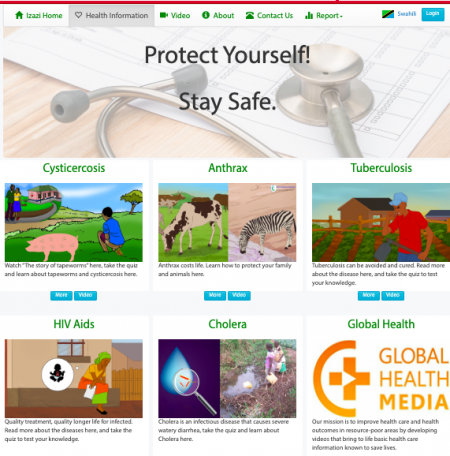DigI:Processes and Technology
From its-wiki.no
| Digital Inclusion (DigI) | |||||||
|---|---|---|---|---|---|---|---|
|
Processes and Technology
Processes
The DigI team consists of 11 partners from 8 countries. In order to collaborate efficiently, we have established the overall process flow. In this document we'll only describe the technical parts.
1) Village Web sites Yeboo.com
User story: A user finds a Wifi hot spot named BasicInternet. With the tablet or his/her own Smartphone, the user can connect to the hot spot. By opening a browser and typing Yeboo.com the user is redirected to the health information site, being health_information_dashboard.php
A) Yeboo Web site development: Maurice. The Web site shall have a common directory for all villages, and one specific directory (or a configuration file) for the specific villages. Thus, it will allow us to make one SD-card for all villages, and just "set the village name or redirect the Web server for that village. As an example, yeboo.com points to /var/www/yeboo/index.htm on the RPI, and this index.htm file is a copy of index_izazi.htm, index_migoli.htm, index_esilalei.htm ...
1. Yeboo site implementation: Hamed and Wisam install the specific village index.htm on the RPI and link it with the locally used LNCC
2. FeedBack on information usage: Maurice gets frequent results on the login to the village website, surveys, and questionnaires
3. Feedback on data usage, and access in the various locations: Josef and Maghsoud
To be done:
- Easier architecture: one /var/www/yeboo/common where all common files are located
- logical representation of village: Izazi, Migoli, ....
- Updating the existing running RPI in Izazi, and Migoli
Next steps:
- Maurice to provide a proposal on how these steps can be performed
2) Preparation of LNCC and RPI
User story: The LNCC gets a universal configuration, making it possible to be swapped by another device. Though, the name of the RDB52G corresponds to a specific certificate, to be installed in
Questions:
- @Maghsoud: What is the advantage of using a specific certificate per LNCC?
2.A) Conversion of Web content to Raspberry Pi (RPI).
Wisam:
- Configuration of the LNCCs according to the DigI project certificates and filtering files.
- documented the process on OwnCloud (steps described in Owncloud = DeviceConfiguring = LNCC RBD52G)
- download a copy from Yeboo.com (Web server) and install on RPI
- linking each village server (RPI) to the local LNCC used
- documented the steps for download, and link of the RPI on OwnCloud (steps described in Owncloud = DeviceConfiguring = RaspberryPi_VillageServer)
Hamed:
- download a copy from Yeboo.com (Web server) and install on RPI
2.B) Remote configurability of both LNCC and RPI. Implementation by Hamed with support from Maghsoud. Allows us to configure the RPI through the LNCC from "anywhere in the world" using maincorerouter.basicinternet.org
Next steps
- RPI configuration
- Documentation of the remote configurability process
3) Configuring, testing, sending and repair
Wisam:
3.1 Order and configure the information spot equipment (LTE, LNCC, and Village server) and in case of extension spot (Sector antenna, Point reception, and Local hot-spot)
- documented the process on OwnCloud (steps described in Owncloud = DeviceConfiguring = ....)
3.2 Test plans are established for each village on OwnCloud (steps described in Owncloud = DigI-Vision 2030 = Village_installations=...) and sent to the local representer for installation work
3.2 Shipment
3.3 Acceptance test in the field
3.4 Error testing in the field - what can the users test?
3.5 process for replacement
4) Reporting
User story: Goal of the DigI project is to report usage of the local resources from the health information spot. This reporting has two aspects, the reporting from the LNCC on usage and the specific reporting from the RPI
4.1 Reporting rom
5) Voucher sales
Voucher platform
Sales process

